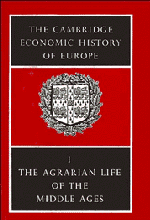Book contents
- Frontmatter
- Chapter I The Settlement and Colonization of Europe
- Chapter II Agriculture and Rural Life in the Later Roman Empire
- Chapter III The Evolution of Agricultural Technique
- Chapter IV Agrarian Institutions of the Germanic Kingdoms from the fifth to the ninth century
- Chapter V Agrarian conditions in the Byzantine Empire in the Middle Ages
- Chapter VI The Rise of Dependent Cultivation and Seignorial Institutions
- Chapter VII Medieval Agrarian Society in its Prime
- §1 France, The Low Countries, and Western Germany
- §2. Italy
- §3 Spain
- §4 The lands east of the Elbe and German colonization eastwards
- §5 Poland, Lithuania and Hungary
- §6 Russia
- §7 England
- §8 Scandinavia
- Chapter VIII Crisis: From the Middle Ages to Modern Times
- BIBLIOGRAPHIES
- Plate Section
- The Roman frontier and the Teutonic Tribes in the first and fourth centuries A.D.
- The Empire of Charles the Great
- Germany in the thirteenth century
- References
§6 - Russia
from Chapter VII - Medieval Agrarian Society in its Prime
Published online by Cambridge University Press: 28 March 2008
- Frontmatter
- Chapter I The Settlement and Colonization of Europe
- Chapter II Agriculture and Rural Life in the Later Roman Empire
- Chapter III The Evolution of Agricultural Technique
- Chapter IV Agrarian Institutions of the Germanic Kingdoms from the fifth to the ninth century
- Chapter V Agrarian conditions in the Byzantine Empire in the Middle Ages
- Chapter VI The Rise of Dependent Cultivation and Seignorial Institutions
- Chapter VII Medieval Agrarian Society in its Prime
- §1 France, The Low Countries, and Western Germany
- §2. Italy
- §3 Spain
- §4 The lands east of the Elbe and German colonization eastwards
- §5 Poland, Lithuania and Hungary
- §6 Russia
- §7 England
- §8 Scandinavia
- Chapter VIII Crisis: From the Middle Ages to Modern Times
- BIBLIOGRAPHIES
- Plate Section
- The Roman frontier and the Teutonic Tribes in the first and fourth centuries A.D.
- The Empire of Charles the Great
- Germany in the thirteenth century
- References
Summary
Introductory
Sources
Study of the medieval agrarian history of Russia is beset with many difficulties. The first difficulty is that the written sources, especially prior to the fourteenth century, are extremely limited. Russian chronicles are relatively abundant and varied, but they are not primarily concerned with matters of interest to the economic, still less the agrarian, historian. They refer, however, to famines, peasant disturbances and similar matters, and even quote from deeds, such as contracts, usually made between the princes ruling different parts of the territory. From the twelfth century, though, we have only two original deeds, the earlier of which is a grant with immunities, dated about 1130. The other, which at least one scholar does not accept as genuine, is a deed of gift from the late twelfth century or possibly early thirteenth century. There are a few other similar deeds of gift and sale which have come down to us, allegedly from a period prior to the Mongol invasions of the thirteenth century. None are original documents and some are certainly forgeries of later date.
The collection of legal material known as Russkaya Pravda is also an important source, the earliest parts of which were probably recorded in the first half of the eleventh century; it throws more light, however, on social relations than on economic matters. There are also later law codes drawn up in the centralized state, Muscovy, dating from the end of the fifteenth century. These are helpful supplements to the many hundreds of deeds, mostly from the fifteenth and sixteenth centuries, which have come down to us. There is, however, no equivalent even in these centuries to the abundant estate records available for the thirteenth and fourteenth centuries in England.
- Type
- Chapter
- Information
- Publisher: Cambridge University PressPrint publication year: 1966

